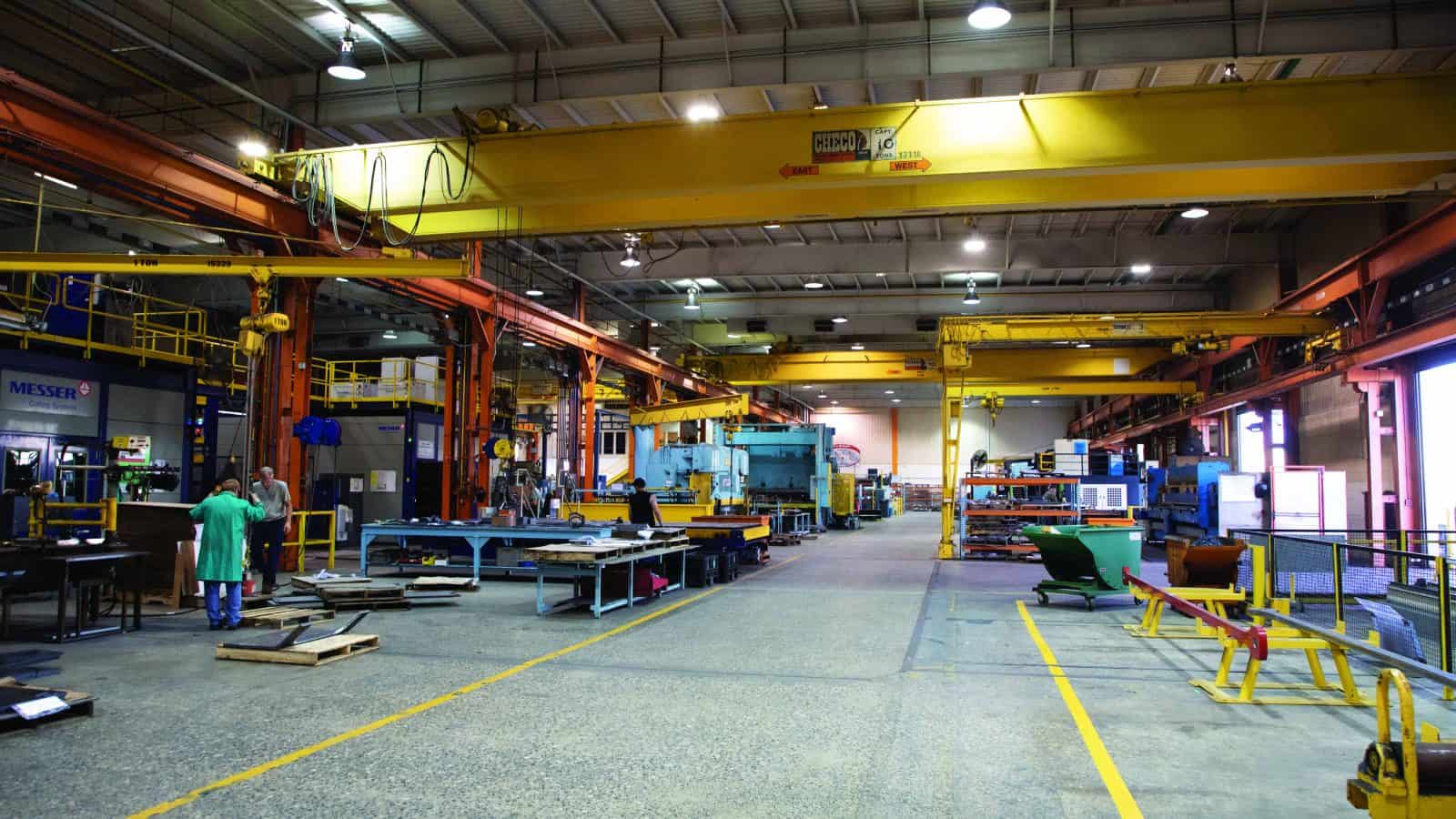What Manufacturers Want Out of an Immigration System

Generations of immigrants have enriched and strengthened manufacturing in the United States. That’s why the NAM has long focused on supporting an immigration system that offers opportunity for workers, support for businesses and certainty for our economic future.
Our priorities: The NAM is interested in immigration rules that prioritize national security and address workforce realities, while also dealing compassionately with the people seeking to come here for a better life.
- That means establishing a safe and secure border, making reforms to the legal immigration system, offering opportunities to attract and keep talent in the U.S., addressing uncertainty in immigration status and clearing immigration backlogs so that new cases can be addressed efficiently.
Our solutions: To accomplish these goals, the NAM has offered a series of solutions for national policymakers and other leaders, including:
- Fund border security via consistent appropriations;
- Increase employment-based immigration;
- Reform nonimmigrant visas and temporary worker programs to reflect employer needs, including a fund to support domestic STEM education programs;
- Provide a permanent and compassionate solution for people facing uncertainty, including Dreamers (people brought here as children); and
- Reform asylum and refugee programs for a more orderly and humane system.
Making progress: Already, we’ve seen important success. Recently, after NAM President and CEO Jay Timmons pressed Department of Homeland Security Secretary Alejandro Mayorkas about the need to reduce the visa backlog to ensure the industry can get the workers it needs, U.S. Customs and Immigration Services announced that it is on track to disburse all available green cards this year.
- “Addressing the green card backlog and providing green cards to hardworking and talented immigrants in the manufacturing workforce is an important step to address the current workforce crisis and support a stronger economy,” said Timmons.
- “With the workforce crisis contributing to inflationary pressures and economic uncertainty, we truly cannot afford to let more green cards go to waste and leave talented individuals who contribute to our economy on the sidelines.”
Learn more: The NAM recently released an updated version of its immigration policy roadmap “A Way Forward.” You can also find more information in “Competing to Win”—the NAM’s blueprint for policies that support manufacturing in America.
Phoenix Closures Invests in Diversity and Inclusion
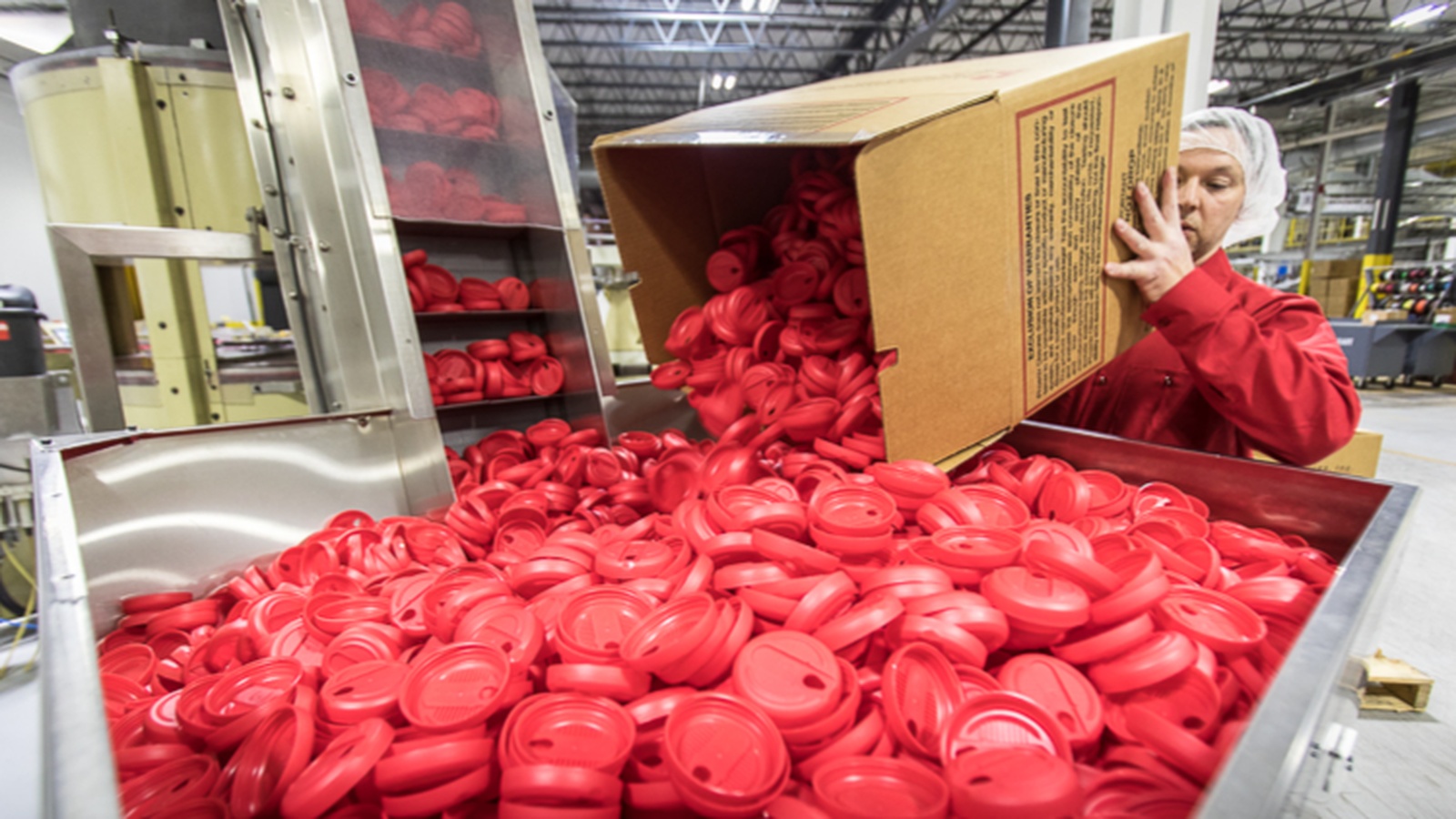
Manufacturers come from many different communities and backgrounds—and Phoenix Closures, a sixth-generation, family-owned business that makes packaging and closures, wants to make sure that all of them feel welcome in the industry. In the past few years, the company has created a D&I initiative that ensures their employees feel included in and excited about the place where they work.
Getting the ball rolling: The company began by installing a leader to oversee their D&I efforts and combine programming and support into one place. Vice President of Quality and Corporate Social Responsibility Meena Banasiak—a 2020 honoree at the Women MAKE Awards, formerly known as the STEP Ahead Awards—sees her role not only as that of a leader, but as proof of Phoenix’s commitment.
- “I’m part of our progress in terms of D&I at Phoenix,” said Banasiak. “This position I am in was created in order to have someone in the role to establish a framework for corporate social responsibility. This position had never previously existed.”
- “We knew as a business that we were in many ways doing a lot of things that would fall within a D&I program, but without that clear purpose and intention and definitive resources put behind it.”
- “So, in a very visible and important way, I had the opportunity to be in a position of leadership and join the executive staff as a woman of color and set the course for the nature of this work that we
’ve been pursuing.”
Developing programs: The company has created and implemented a range of initiatives that allow employees to connect and contribute.
CSR committee: Phoenix developed an employee resource group that is focused on corporate social responsibility and includes representation from all the company’s operating locations. Employees are encouraged to voice their ideas on the types of programs that could be offered to the workforce, and the group offers tools and resources to help members implement programs at their respective sites.
- “It’s great to have a way to give people that voice, to make the work environment something
 that enables us to feel more included,” said Banasiak. “Yes, we’re here to do good work, but we might just be able to have fun while we’re doing it! We want our employees to feel comfortable bringing their whole selves to work if they want to and develop more profound relationships in the process.”
that enables us to feel more included,” said Banasiak. “Yes, we’re here to do good work, but we might just be able to have fun while we’re doing it! We want our employees to feel comfortable bringing their whole selves to work if they want to and develop more profound relationships in the process.”
Parental leave: The company has expanded its parental leave benefits. Today, all full-time employees are eligible for the program, and the benefit applies to the non-birthing parent as well—including in cases of adoption.
- “There are people who have been able to take advantage of it right away—and just hearing their personal story, and their sense of relief knowing they have this support from their company—it’s unfettered relief,” said Banasiak. “It goes a very long way toward cementing the relationship between employer and employee, when you feel like your employer is invested in you.”
Volunteer time off: Phoenix’s full-time employees are encouraged to take up to eight hours of paid time off per calendar year to volunteer with the charitable organization of their choice—either individually, or as part of a team.
- “There have been a few different events where a group of employees have gone together, so it simultaneously serves as a teambuilding exercise with a broader impact,” said Banasiak. “At the same time, we get to share the stories of these experiences and celebrate those organizations that our employees find meaningful to them. Excitement breeds further excitement.”
Pledge for Action: Phoenix was a signatory of the NAM’s Pledge for Action, which committed the manufacturing industry to taking 50,000 tangible actions to increase equity and parity for underrepresented communities, creating 300,000 pathways to job opportunities for Black people and all people of color, and reflecting the diversity of the overall U.S. workforce by 2030.
Starting small: According to Banasiak, it’s important to be sensitive to needs across the entire company, but also to create small forums where employees can feel comfortable discussing issues. By empowering employees to come forward with ideas, a company can unleash the creativity, energy and enthusiasm of a diverse workforce.
Building the habit: “At first you might be in a place that feels more performative rather than substantive, but it’s still a legitimate starting point,” said Banasiak.
- “We never before made an intentional effort to acknowledge Hispanic Heritage Month or Black History Month. By now, our employees are creating and hosting their own events—but before that, our first step was literally a single email to the organization.”
- “I’d argue that first step is every bit as necessary and valid on this journey. Just making that conscious effort—that’s going to be meaningful to someone. It’s necessary to build that habit in small ways to create an environment where ideas start to flow. The motivation builds upon itself, but you have to start somewhere.”
The bottom line: “Results are not instantaneous or something that one person can achieve,” said Banasiak. “It’s about slowly shifting the narrative.”
Timmons Talks Immigration in Minnesota
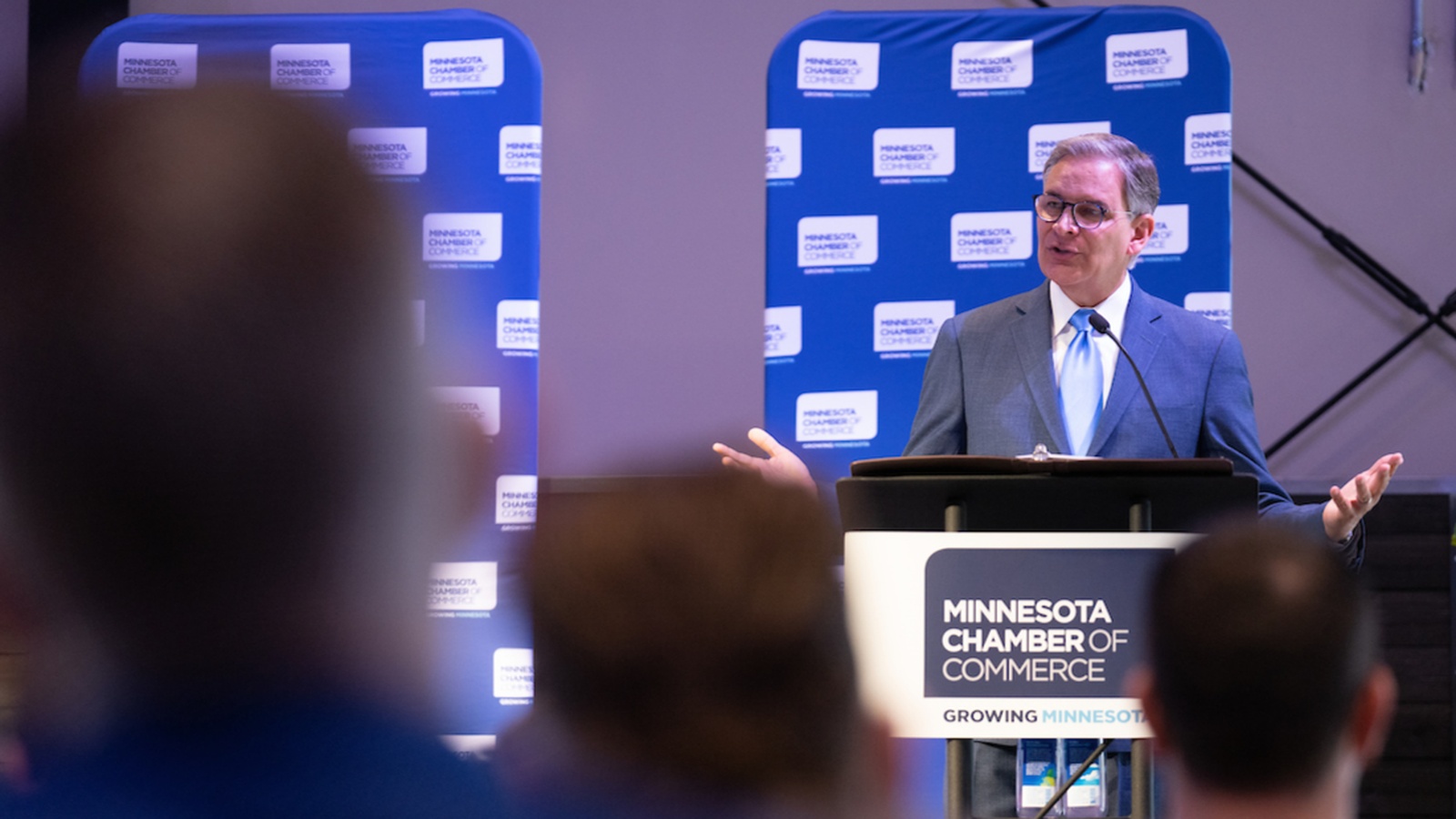
Manufacturing in the U.S. is advancing, but to grow it needs more workers—including via immigration. That’s why immigration reform is one of the NAM’s key policy priorities to boost the industry’s competitiveness, as NAM President and CEO Jay Timmons told the Minnesota Manufacturers’ Summit yesterday in Minneapolis. The event was hosted by the Minnesota Chamber of Commerce.
- This week, the NAM released an updated version of its immigration policy blueprint “A Way Forward,” which Timmons highlighted in his speech.
What our immigration system needs: “Despite all the overheated rhetoric, one thing we can agree on is this: the United States has a broken and unreliable immigration system—and it is harming manufacturers’ competitiveness,” said Timmons.
- He cited the need for more employment-based H-1B visas; more temporary H-2B visas; more programs for foreign-born U.S. students in STEM fields; a new visa category to address temporary economic needs in the U.S.; and protection for Dreamers along with a pathway to legal status for unauthorized U.S. residents.
Other priorities: Timmons also covered other key manufacturing priorities, including energy policy fixes.
- “Congress can deliver sustainable permitting improvements that can fast-track critical infrastructure projects and speed up the construction of new manufacturing facilities,” he said.
- “The situation in Europe and the actions of OPEC show us this isn’t just an issue of economic competitiveness. It’s also an issue of national security.”
Reducing the burden: “Policymakers can also help by streamlining regulatory policy in general,” Timmons added. “The annual regulatory cost burden for an average U.S. firm represents 21% of its payroll.”
- “Manufacturers support smart, sensible regulation to protect our health, our workplaces and the environment. But the more time and resources manufacturers spend on their compliance burden every year, the less we can spend solving our greatest challenges.”
The bottom line: “Whether it’s permitting reform or immigration reform, building on tax reform or advancing workforce solutions, manufacturers are positioned to lead,” said Timmons. “So, our role is to be true to the values that have made America exceptional and kept manufacturing strong: free enterprise, competitiveness, individual liberty and equal opportunity.”
Further reading: Timmons has been hitting the road this week to promote manufacturers’ priorities to leaders across the country. If you missed it, catch up on his earlier speech in Phoenix, Arizona.
Manufacturers Renew Call for Action on Immigration
NAM CEO says broken system is harming manufacturers’ competitiveness
Washington, D.C. – National Association of Manufacturers President and CEO Jay Timmons addressed the Minnesota Chamber of Commerce’s Manufacturers’ Summit today, where he made another call for policymakers to act on immigration, saying it is time to “fix this problem now.” Timmons called on Congress to act in the year-end government funding bill. His remarks come as the NAM rereleased its immigration proposal “A Way Forward.”
Excerpts from Timmons’ speech:
“First and foremost, this is a humanitarian issue. We see it play out in tragic ways—including family separations at the border and confusion as families seek to reunite following a harrowing journey.”
“But as manufacturing and business leaders, we also know there are serious economic consequences. Research and development—the cornerstone of innovation and our industry’s success—depends on access to the best and brightest from across the world.”
“The broken immigration status quo is also preventing us from growing our talent pool, leaving jobs unfilled. There are around six job seekers for every 10 job openings in the U.S., and our population growth is slowing. Last year, the U.S. population grew at its slowest rate ever.”
“Last year’s infrastructure law and this year’s CHIPS and Science Act prove that Congress can still get bipartisan things done—and immigration should be next on the list, whether it’s one bill or multiple bills. We would absolutely support a long-term, comprehensive legislative fix that addresses all of these issues, but we also want to be realists. We have a workforce crisis that needs to be addressed now, so let’s take action where we can. We want to focus on the art of the possible. One approach would be to address some of these issues in the year-end government funding bill.”
First released in 2019 and updated to reflect current challenges, the NAM’s “A Way Forward” proposal identifies seven core areas of action for Congress and the administration to take:
- Strengthen border security through physical infrastructure and best-in-class technology.
- Prioritize America’s workforce needs through reforms to the legal immigration system.
- Reform nonimmigrant visas and temporary worker programs to reflect employer needs, including a fund to support STEM programs so that we can reduce the need for these types of visas in the future.
- Provide a permanent and compassionate solution for populations facing uncertainty, including the Dreamers, who were brought here as children and know no other home.
- Reform asylum and refugee programs for a more orderly and humane system, including asylum standards consistent with our values.
- Fix the problem of the unauthorized population with a firm reset, requiring an orderly process of review, including financial penalties for those who seek to become legal and deportation for those who choose to stay in the shadows.
- Strengthen the rule of law so that it is respected and followed by all, with a focus on gang violence and also on requiring localities to cooperate to advance the enforcement of immigration priorities.
View “A Way Forward” in full here.
-NAM-
The National Association of Manufacturers is the largest manufacturing association in the United States, representing small and large manufacturers in every industrial sector and in all 50 states. Manufacturing employs more than 12.8 million men and women, contributes $2.77 trillion to the U.S. economy annually and accounts for 58% of private-sector research and development. The NAM is the powerful voice of the manufacturing community and the leading advocate for a policy agenda that helps manufacturers compete in the global economy and create jobs across the United States. For more information about the NAM or to follow us on Twitter and Facebook, please visit www.nam.org
Manufacturers Notch a Critical Victory in Washington Alliance of Technology Workers v. DHS
Following Intervention by the NAM and Other Business Groups, D.C. Circuit Upholds STEM OPT Program
Washington, D.C. – Following a 2–1 decision by the D.C. Circuit affirming the validity of a program that provides hundreds of thousands of skilled workers for manufacturers and other American businesses, National Association of Manufacturers Chief Legal Officer Linda Kelly released the following statement:
“The NAM Legal Center is incredibly proud of today’s victory, which helps ensure the continued availability of hundreds of thousands of highly skilled workers for manufacturing roles. As manufacturers continue to experience significant labor shortages, the STEM OPT program remains a critical talent pipeline, providing opportunities for high-skilled graduates to enhance their education through hands-on work. Today’s win builds on the NAM’s impressive track record of defeating unlawful restrictions and meritless attacks on critical visa programs.”
Background:
Without the STEM OPT program, manufacturers would be unable to fill critical positions requiring specialized training in science, technology, engineering and math. So, in 2018, after an anti-immigration activist group brought a lawsuit against the Department of Homeland Security seeking to invalidate the entire STEM OPT program, the NAM and two other business groups moved to intervene as defendants in the case. That motion was granted, and in December 2020, the District Court for the District of Columbia granted the NAM and its co-intervenor defendants’ motion for summary judgment, ruling that DHS acted within its statutory authority and in accordance with the Administrative Procedure Act by continuing the STEM OPT program. The plaintiff activist group appealed to the D.C. Circuit, and today, the court issued its decision—rejecting the plaintiff’s bases for invalidating the STEM OPT rule and affirming the lower court’s judgment.
-NAM-
The National Association of Manufacturers is the largest manufacturing association in the United States, representing small and large manufacturers in every industrial sector and in all 50 states. Manufacturing employs more than 12.8 million men and women, contributes $2.77 trillion to the U.S. economy annually and accounts for 58% of private-sector research and development. The NAM is the powerful voice of the manufacturing community and the leading advocate for a policy agenda that helps manufacturers compete in the global economy and create jobs across the United States. For more information about the NAM or to follow us on Twitter and Facebook, please visit www.nam.org.
New Hiring Pipeline Highlight: Pfizer’s Refugee Hiring Program
In 2021, Pfizer launched a company-wide Refugee Hiring Program, with the goal to hire a minimum of 100 refugees by the end of 2022 and provide mentorship opportunities to an additional 150 — with 50 of these opportunities earmarked for LGBTQ+ refugees. In less than a year, the initiative is well on its way to reaching its goal — having hired 68 refugees so far — and garnering widespread enthusiasm from Pfizer’s workforce.
“The knowledge curve might be a little [steeper], but in the end, there’s so much data that shows refugee hiring pays off immensely,” said Mona Babury, one of the creators of the program at Pfizer. “They’re very hardworking, loyal and thankful for the opportunity to enter a new workforce.” Read more about the program details and success here.
Interested in learning how to start your own program? Check out these webinars from the MI team on hiring refugee talent:
Pfizer’s Refugee Hiring Program Changes Lives
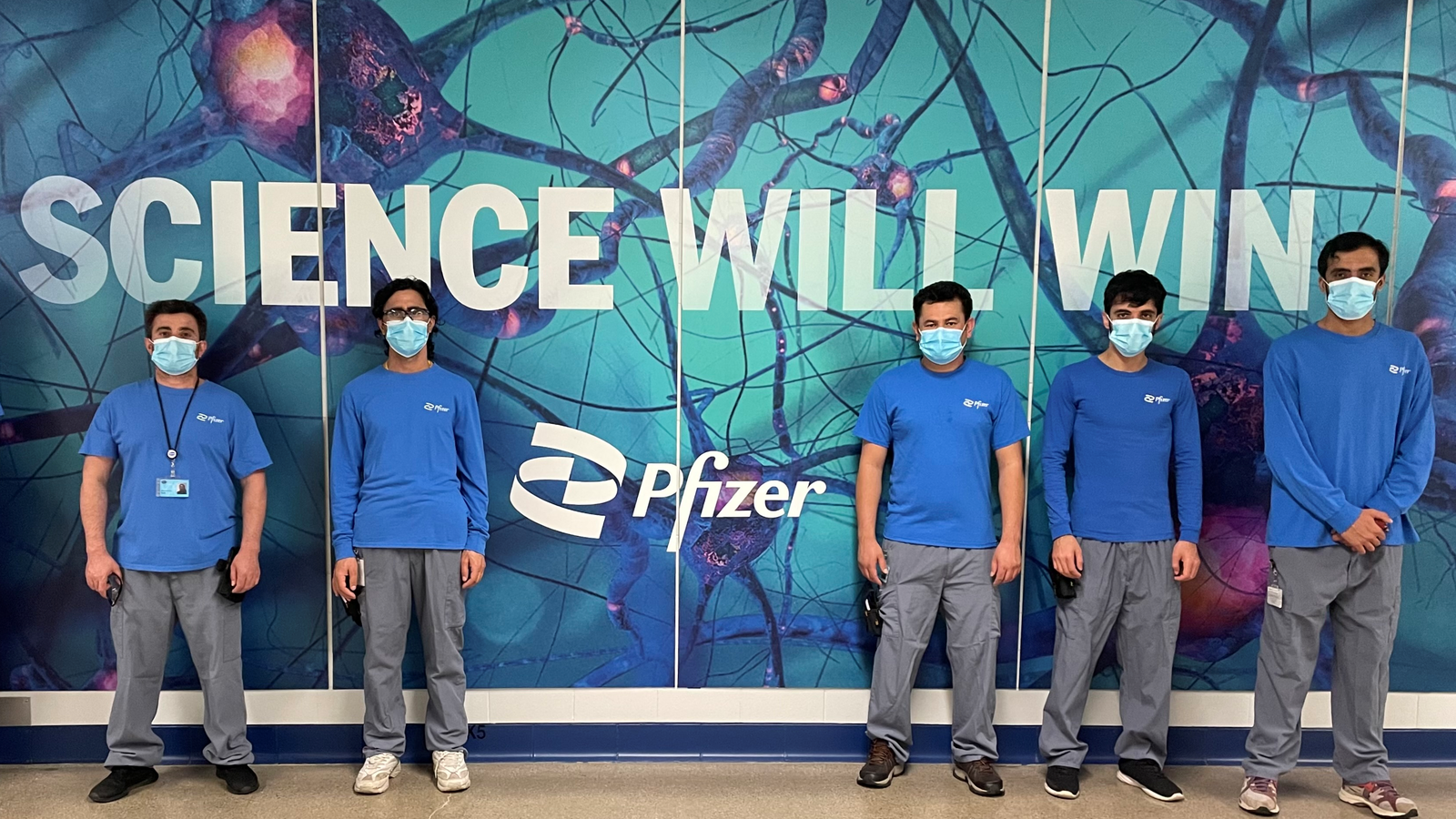
As Mona Babury tells it, Pfizer’s refugee hiring program was born out of the basic human need to connect during a time of shared anguish.
Wanting to help: Last August, Babury, the pharmaceutical company’s director of global diversity, equity and inclusion, was horrified by news coverage of the Taliban taking over Afghanistan and refugees fleeing.
- Babury’s husband had fled Afghanistan for the United States with his family at the age of 5, some 40 years before, so she had a personal connection to the events unfolding.
- She felt an urge to talk to someone who would understand, so she turned to Pfizer Executive Vice President and Chief People Experience Officer Payal Sahni, also a former Afghan refugee. In the course of their conversation, an idea popped into Babury’s head.
Lightbulb moment: “I said, ‘Why don’t we create a refugee hiring program? It will give [refugees] a glimmer of hope when they’re coming here with just the clothes on their backs,’” Babury recalled. “Within minutes, she responded, ‘Go for it.’”
Making it a reality: Pfizer, which had close to 1,000 job openings it was looking to fill, had never created a refugee hiring program before. “We didn’t have a playbook,” Babury said.
- The team decided to research similar initiatives, and in doing so contacted The Tent Partnership for Refugees, a nonprofit organization established by Chobani founder Hamdi Ulukaya to help businesses hire and train refugees.
- Thanks to Tent’s help, Pfizer’s Refugee Leadership Initiative was launched in mere days, with Babury named as its leader.
- Its goal? Hire a minimum of 100 refugees by the end of 2022 and provide mentorship opportunities to an additional 150—with 50 of these opportunities earmarked for LGBTQ+ refugees.
Following through: In less than a year, the initiative is well on its way to reaching its goal—having hired 68 refugees so far. The enthusiasm from Pfizer’s workforce has been immediate and widespread.
- After sending an email announcing the program globally, “we had 300 colleagues email back [within a few hours] saying they wanted to volunteer, to support us in any way they could,” said Babury.
- At Pfizer’s Kalamazoo, Michigan, facility, where the initiative has been most successful, “one [team] leader took this very personally,” hiring 18 Afghan refugees since the beginning of 2022, said Babury. In partnership with a local refugee agency, he has also made “a commitment to continue to further ramp up hiring efforts.” (Learn more here.)
Going above and beyond: Pfizer, which now works directly with the not-for-profit humanitarian organizations Tent for Refugees, Welcome.US, the International Rescue Committee and eight other resettlement agencies to source and hire refugees, does more than extend job offers.
- Though the new employees do not require sponsorship to work in the United States, owing to their refugee status, they do need help restarting their lives. Pfizer provides up-front bonuses to help cover the costs of transportation to and from work and to help them obtain driver’s licenses.
A winning formula: Seeking out refugees as employees can be an enormously rewarding sourcing strategy for a manufacturing company, Babury said.
- “The knowledge curve might be a little [steeper], but in the end, there’s so much data that shows refugee hiring pays off immensely,” she said. “They’re very hardworking, loyal and thankful for the opportunity to enter a new workforce.”
A proud moment: “I am so proud of the incredible progress we have made in support of this important and impactful initiative,” said Pfizer Chief Global Supply Officer Mike McDermott. Pfizer Global Supply, Pfizer’s manufacturing and supply organization, has hired the most refugees at Pfizer to date.
- “Our smart, talented and dedicated new colleagues are already making a difference. We welcome their fresh perspectives and have been motivated by their pride and passion,” he continued.
- “I’d also like to recognize our PGS colleagues for welcoming these new teammates with open arms, supporting them both professionally and personally,” he added. “Everyone deserves a fresh start, and we consider it an honor and a privilege to play a role in the new chapters for these refugees and their families.”
Success stories: The backgrounds of many of the recent hires are as impressive as they are diverse.
- The very first refugee hire, a man named Afzal Afzali, had been working for the U.S. embassy and the American University of Afghanistan when the Taliban seized control last summer. “He had to make a decision to escape within a few hours of the invasion,” according to Babury. “On his way out, he rescued four unaccompanied children protected by the U.S. government and reunited them with their mother in the United States.”
- Afzali, who now lives with his family in Texas and works at Pfizer in procurement, told the company the new job has led him to finding his “life’s purpose in serving others … likewise, Pfizer is all about breakthroughs that change patients’ lives.”
- Another new employee had previously worked with the Afghan president. She is now a senior associate on Babury’s team. She was recruited through the Pfizer Refugee Leadership Initiative Mentorship program.
The last word: Seeing the success of these new employees energizes those around them, said Babury.
- “The leader at our Kalamazoo site will speak to you with such a light in his eyes about how … once these hires have a job, they don’t consider themselves refugees anymore. They’re people with jobs. They have a way to take care of their families. There is a sense of pride among all our colleagues because of this program.”
GE Appliances Sees Success in Hiring Afghan Refugees
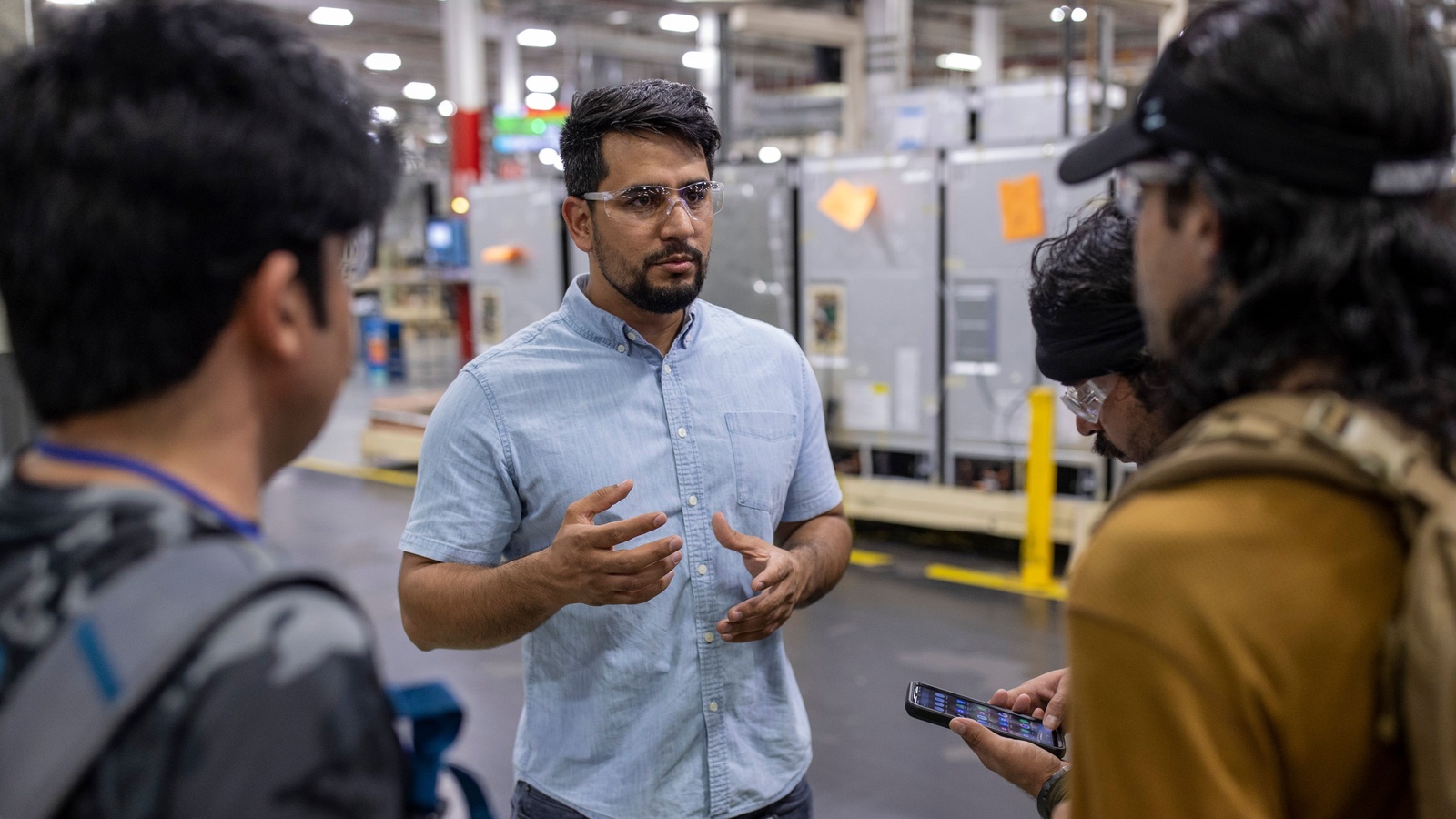
It’s been almost a year, but the sights and sounds are never far from his thoughts: crowds of people surging toward departing planes, trampling those who stumble; gunshots ringing out; the explosion of a nearby bomb.
For Edris Akseer, now a bilingual recruiting coordinator at GE Appliances’ (GEA) Louisville headquarters, these memories are daily reminders of the horrors that he, his wife and his brothers endured in Afghanistan to get to the United States—and how different his situation is today.
- “That day [I left] was the worst day of my life,” recalled Akseer, a former translator for the U.S. Army in Afghanistan who was able to secure passage out through his U.S. military connections. “[But] I’m happy here. I really enjoy helping others and I find my job really interesting. … I saved enough to buy a car and I’m working on getting my driver’s license.”
Helping refugees: Akseer is one of more than 100 non-U.S.-born employees brought on in recent months by GEA in Louisville. About 50 are refugees from Afghanistan who came here last fall when the U.S. military exited the country. The other half are Spanish-speaking and hail from multiple nations.
- “In early 2022, we had a new production line–and we needed to hire over 1,300 people,” recalls GE Appliances Senior Manager Beth Mickle, who runs the production recruitment group at the company’s large campus in Kentucky.
- “Catholic Charities and Kentucky Refugee Ministries said they [were helping] a group of people from Afghanistan and said, ‘We think you would be a great employer for them. Would you be interested in taking a shot at this?’”
- GEA was interested—and opening the hiring process to refugees and other immigrants has been one of the best workforce decisions the company has made in recent memory, Mickle said.
Location, location: As a longtime U.S.-immigration entry point, Louisville has large populations of non-native-born people, said GE Appliances Workforce Development Recruiter Gabriela Salazar.
- These include people from the Democratic Republic of Congo, Cuba, Peru, Honduras, Venezuela and Mexico, said Salazar, who recently conducted a survey of languages spoken among GE Appliances employees. The findings: production staff at three factories communicate in a total of more than 40 languages.
- In a sense, working with charities to hire refugees is the next step in the company’s hiring practices. It “has helped us to tap into populations we might not have known how to tap into before,” Mickle said.
Learning as they go: GE Appliances now offers new-hire orientations in many languages, including Afghanistan’s official languages of Pashto and Dari, as well as Spanish and Swahili.
- The company also has a buddy system which pairs new employees with workers who have been at the facility for a while.
- “These are employees who volunteer to be points of contact, to help show people around,” Mickle said. “You know, ‘Where is the bathroom? ‘Where do I get my protective gear?’ We also translate all the new-hire documents [into native languages] because they won’t remember everything from their first day.”
- Recently GE Appliances hired an American Sign Language translator to help its deaf employees. “Where it started was different languages—and now we’re seeing a lot of new horizons,” Salazar said.
Onward and upward: Akseer has seen a lot of new horizons himself in the past few months.
- He was originally hired at GE Appliances as one of its much-needed production-line team members, but owing to his fluent English, compassion and constant willingness to help, Akseer was “always being pulled of the line to help translate” something for another new employee, according to Mickle.
- So when a translator role opened up on Mickle’s team mere months after his hiring, Akseer was in. “He was already doing the role of what we needed him to do. He’s just a natural teacher,” Mickle said.
- On top of the new country, the new company and the two new jobs in quick succession, Akseer underwent another major change: becoming a new father. His son was born shortly after the family came to the U.S.
Advice for other manufacturers: Hiring refugees and other immigrant workers has been a boon for GE Appliances, Mickle said, and other manufacturers should consider following suit if they can.
- “They are the first to raise their hands for overtime,” she said. “They work very, very hard. In [manufacturing], our jobs are not always the easiest. But they do it and they love it.”
The last word: “Manufacturers that bring on refugees see fewer turnovers and increased efficiency,” MI Vice President of Strategic Engagement and Inclusion AJ Jorgenson said. “They’re also helping to improve lives and communities. More inclusive workplaces strengthen manufacturing.”
Husco Provides Jobs to Afghan Refugees
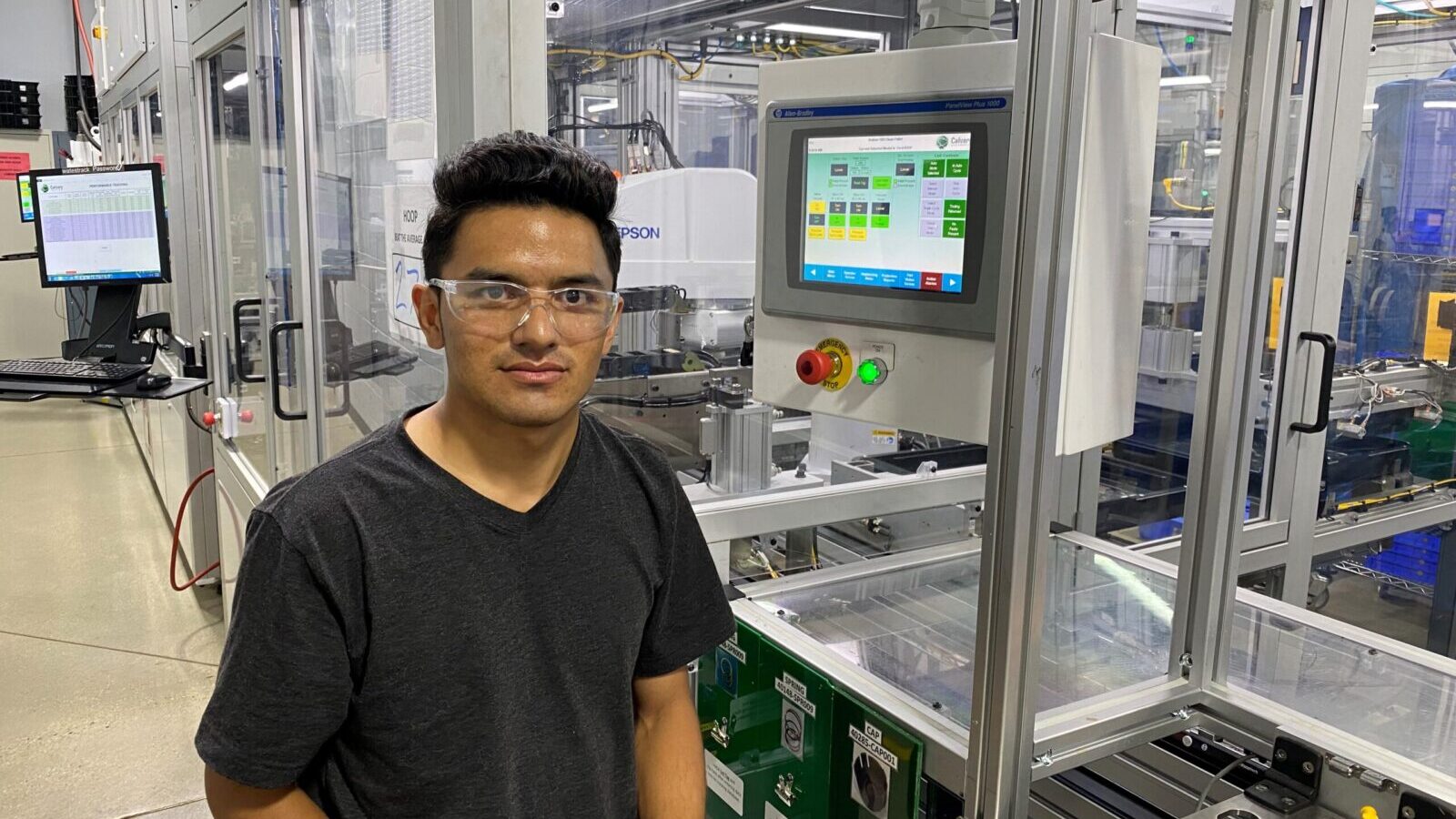
For Jason Schuetz, Husco’s vice president of global operations and advanced manufacturing, what started out as meeting a business need at his company has turned into something profoundly more fulfilling.
How it all started: The Waukesha, Wisconsin–based company, which specializes in hydraulic and electromechanical control systems, had open positions that needed to be filled—a challenge that many manufacturers face daily.
- “We were struggling for a long time to fill the positions that we had open. And we knew that if we continued to think in conventional ways, we would get conventional output and that was not much,” said Schuetz.
- “We were short a number of direct hire positions, similar to a lot of places in the area,” added Husco Director of Operations Mark Dreikosen. “We were looking for creative solutions to fill our staffing needs.”
An opportunity knocks: After months of minimal results in the hiring search, an opportunity was brought to Husco through Lutheran Social Services to help provide jobs for Afghan refugees who fled from the Taliban and relocated in Waukesha.
- After many internal conversations and external meetings with Lutheran Social Services and Manpower International, a global workforce solutions company, Husco moved forward in March.
- The result? Over the past several months, Husco has hired and welcomed 33 Afghan refugees.
- “It was needs based, really, for Husco,” said Dreikosen. “Fortunately for us, it wasn’t the first time we’ve done something like this. We’ve helped support groups who have emigrated from Myanmar, formerly Burma, under similar context where there’s political unrest.”
Adapting to change: Schuetz said that 2016 experience helped Husco prepare for some of the challenges the company faced with regard to documentation, language and some cultural differences, but new challenges surfaced as well.
- Schuetz said that being very fresh to the U.S. workforce, the refugees needed to be taught what the “professional expectations were in the U.S.”
- Work instructions needed to be translated into Pashto and reformatted to accommodate reading from right to left rather than left to right.
- “None of the individuals had licenses or had a means of getting to work,” said Schuetz. “So, we needed to quickly lean on and partner with Manpower—who has been vital in this—to help find and set up transportation.”
- To accommodate religious needs, Husco set up multi-faith meditation spaces so the new employees can pray throughout the day. In addition, for a facility-wide event during Ramadan, the company catered appropriate food so individuals could still participate and be part of the team while practicing their religious obligations.
Breaking the language barrier: To help the refugees’ English-speaking skills, Husco ensures there are translators available on every shift.
- Two employees, Hamza Jebran and Baitullah Jan—Afghan refugees themselves who studied English—serve as translators for their new colleagues. (Click here to watch an interview with Jebran.)
- “Another of our employees, Habib, couldn’t speak a word of English when we first met him a few months ago, and now we can have a conversation with him,” said Dreikosen. “Sometimes we will have one of our employees come up during a shift meeting and teach the rest of the crew some Pashto as they’re trying to learn some English and share their culture at the same time. It’s really cool to see.”
Eager to learn: For Dreikosen, the refugees’ motivation and eagerness to learn transcend the language and other cultural differences.
- “They’re as driven and motivated as any other employee who comes through Husco’s doors—and we caught on to that very quickly,” he said. “Their drive for success, given their situation, and how important it is to have a home and to feel welcomed, it’s inspiring.”
Strong foundation: Schuetz says that what has made Husco’s refugee program a success is the company’s strong foundation with its current employees.
- “It’s been successful for us because we have always made it a point to treat our people fairly and with respect,” he said. “The refugees have been welcomed by their fellow employees because they know that we treat everyone this way, and we would help anyone. There are many challenges, but this team decided they were going to make this work, and every obstacle that they encountered, they knocked it down and moved the ball forward.”
- The support from Husco has made the program a success: “It starts with our supervisors, our quality engineers, our technicians—they’re all in. They know there’s going to be bumps along the way, but they’ve bought in and know that this is the right thing to do,” said Dreikosen.
- Dreikosen notes that Husco is now receiving more referrals and inquiries from job seekers of all sorts of backgrounds. They’ve heard about the good the company does and how welcoming it is, and that attention has made the company more attractive in the eyes of job seekers.
The last word: “When this opportunity was brought to us through Lutheran Social Services, we grabbed onto it tightly and realized that with the challenges that we were going to encounter day to day, the end game was so much greater,” said Schuetz. “It’s been rewarding in so many ways.”
What the NAM says: “With more than 900,000 open jobs in manufacturing, we need to attract and hire from the widest talent pool possible,” said Manufacturing Institute President Carolyn Lee. “When manufacturers hire refugees, they see fewer turnovers and increased efficiencies, and at the same time, they’re helping improve the lives of refugees, their families and communities. Increasing diversity in the talent pool and developing more inclusive workplaces strengthens the competitive advantage of our industry and our workforce.”
DACA Recipients Deserve Certainty

As we mark a decade since the introduction of Deferred Action for Childhood Arrivals, millions of hardworking people—many of whom were essential workers during the pandemic—remain uncertain of their future, NAM President and CEO Jay Timmons said today, as he urged Congress to act.
What’s happening: The vast majority (94%) of those eligible for DACA, a program that provides two-year deportation deferments for some non-U.S.-born young people, are employed in the country’s workforce, Timmons noted in communication to Congress.
- “More than three-quarters of DACA recipients were essential workers during the COVID-19 pandemic,” Timmons said. “In fact, DACA recipients are involved in work across the economy, from construction to hospitality to manufacturing.”
The manufacturing angle: The manufacturing sector, which has nearly 1 million job openings, can’t afford to lose skilled members of its labor pool, according to Timmons.
- “Further disruptions to the legal status of this worker population would be devastating,” he said.
What can be done: Legislators should make moves before the scheduled July 6 Court of Appeals hearings on DACA’s legality, Timmons recommended.
“Congress should act ahead of the courts and legislate to ensure a stable future for this population. We look forward to engaging with [policymakers] as we work towards a solution for these deserving individuals.”
